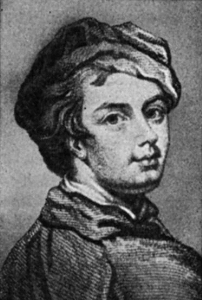John Gay was born in Barnstaple, Devon, England on June 30, 1685. At the age of 10, Gay was orphaned and his uncle, the Reverend John Hammer, agreed to take care of him. After finishing his education at the Barnstable Grammar School, Gay went to London to be an apprentice to a silk merchant. 1 Disliking the work, Gay left the merchant to work briefly for Arthur Hill, who became manager of a theater company. In 1712, in his late twenties, Gay was a secretary to the Duchess of Monmouth. He also worked as a secretary to Lord Clarendon. 2 During his time in London, Gay established relationships with Londoners and became a part of the city society.

In 1713, Gay published the poem "Rural Sports," a comic description of hunting and fishing, and inscribed it to Alexander Pope, a prominent writer of the time. Pope appreciated the honor and soon became acquainted with Gay. 3 Pope and Gay became lifelong friends and colleagues. Gay also became close with the writer Jonathon Swift; Pope and Swift both encouraged Gay to continue writing and publishing his work. Gay studied with Georg Frideric Handel, the greatest opera composer at the time in London. Gay's love for music transferred into much of his writings for the stage; he included some type of music in many of his plays. 4
Read more on the musical scene in England.
Gay published poems, fables, plays, and ballad operas. His most notable works include: 5
- The Shepherd's Weeks, a series of mock-classical pastoral poems (1714)
- What D'Ye Call It, a satirical play (1715)
- "Trivia: Or, The Art of Walking the Streets of London," a poem (1716)
- Three Hours after Marriage, a comedy written with Alexander Pope and John Arbuthnot (1717)
- Acis and Galatea, the libretto to Handel's opera and Gay's final attempt at ballad opera (1719)
- Poems on Several Occasions, a set of poems (1720)
- Fables, a set of beast fables (1727-38)
- Fifty-One Fables in Verse (1727)
- The Beggar's Opera, his famous ballad opera (1728)
- Polly, the sequel to The Beggar's Opera which was published but not performed (1729)
- Achilles (1733)
Although Gay wrote numerous poems and plays, his ballad opera The Beggar's Opera was certainly his greatest success and his most important contribution. John Gay is credited with the first success of the ballad opera genre. Although many scholars believe his ballad opera was the only notable one of its kind, many scholars also believe that his opera led to the popular and successful operettas of Gilbert and Sullivan. The success of the ballad opera was immediate and Gay made a significant amount of money from the opera.
Even though Gay was successful as a writer, he was not a rich man. Luckily, he made friends with some of the high society who helped support him. Most notable were the Duke and Duchess of Queensbury. Gay met them when he was working for the Duchess of Monmouth. The Duchess of Queensbury became Gay's most important patron until his death. 6
John Gay died at the age of 47 on December 4, 1732 in London. He was buried in the Poet's Corner in Westminster Abbey. The inscription on his tomb is taken from The Beggar's Opera and spoken by the Beggar, showing Gay's humor until the end of his life: "Life is a Jest, and all Things show it: I thought so once and now I know it". 7